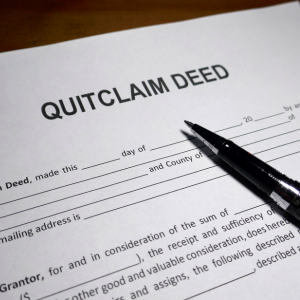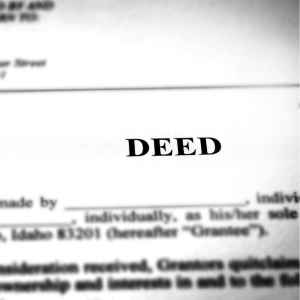
How Does a Quitclaim Deed Work in Texas?
A quitclaim deed is a formal way to give someone else real estate ownership without guaranteeing the title. In Texas, this is done in a certain way that both sides should be aware of.

Who Are the Parties Involved in a Quitclaim Deed?
Two main people are involved in a quitclaim deed deal: the grantor and the grantee. The person giving the property is called the grantor, and the person getting it is called the grantee. This type of deed changes ownership or shares in ownership. Unlike other property deeds, a quitclaim deed doesn’t promise a clear title. The grantor doesn’t guarantee full ownership or that the property is free from others’ claims.
What Are the Legal Implications of a Quitclaim Deed?
Using a quitclaim deed in Texas mainly affects the title transfer. Unlike warranty deeds, quitclaim deeds have no warranty of title. This means the grantor isn’t liable for any problems with the title. This can be risky for the grantee because they only get whatever interest the grantor has, which might be none. Quitclaim deeds are not good for normal real estate sales. They are best for transfers between family members or to fix title problems. Everyone involved needs to know about these legal rights and risks.
Why Is Notarization Important for Quitclaim Deeds in Texas?
Notarization is essential when handling a quitclaim deed in Texas. A notary public must watch the signing to confirm that the grantor executes the document. This process ensures the transaction is valid and helps prevent fraud. In Texas, a notarized quitclaim deed must be recorded at the county clerk’s office, making it part of the public record. Legal help can ensure you handle notarization properly and meet all legal requirements.
Consulting real estate law professionals can provide personalized guidance for anyone considering a quitclaim deed in Texas. At Fast House Buyers Texas, we focus on helping clients make informed property decisions. Contact us for professional assistance and advice.
Preparing to File a Quitclaim Deed in Texas

What Documents Are Needed to File a Quitclaim Deed?
To file a quitclaim deed in Texas, gather all necessary documents for a smooth process. The Texas Quitclaim Deed Form is the main document that is needed. It gives someone an interest in land without guaranteeing ownership. You’ll also need:
- A legal description of the property
- Names of both the grantor (person transferring interest) and the grantee (recipient)
- Any existing mortgage details, if relevant
Always verify your documents for accuracy to avoid issues with the deed’s validity.
How Do You Ensure Accuracy in a Quitclaim Deed?
Accuracy in a quitclaim deed is crucial to prevent legal complications or disputes. To complete a quitclaim deed accurately in Texas, follow these steps:
- Check the Legal Description: Use sources like a past deed or tax records to confirm the property’s legal description.
- Get Professional Help: Consult a real estate attorney or a title company to review your documents. They can spot errors and guide you through the legal process.
- Fill Out the Form Carefully: Carefully enter details on the quitclaim deed form, ensuring names and information match official records.
- Notarization: Have the deed notarized to authenticate signatures, as this is required for filing.
These steps help reduce errors and protect your property rights.
Are There Any Costs Associated with Filing a Quitclaim Deed?
When filing a quitclaim deed in Texas, be aware of the associated costs:
- Filing Fees: Counties in Texas have different filing fees. Check with your local county clerk’s office for specifics.
- Taxes: Although quitclaim deeds might not involve property taxes at transfer, settle any outstanding taxes to avoid future issues.
- Legal Fees: If you hire a lawyer for assistance, consider their fees in your budget.
Understanding these costs helps manage finances and avoid surprises during the deed transfer.
For expert guidance on quitclaim deeds or real estate matters, contact Fast House Buyers Texas for professional support.
Filing Process for Quitclaim Deeds in Texas
Where Should You File a Quitclaim Deed in Texas?
In Texas, you must file a quitclaim deed at the county clerk’s office where the property is located. The county clerk handles public records for real estate transactions, including quitclaim deeds. To register your quitclaim deed accurately and convey the transfer of ownership, visit the specific quitclaim deed office or Texas property deed filing location in that county. Contact the Texas deed office if you have questions or need more information about the filing process.

What Steps Are Involved in Filing a Quitclaim Deed?
To file a quitclaim deed in Texas, follow these steps:
- Quit Claim Deed Preparation: Start by preparing the quitclaim deed. Include essential details such as the grantor’s and grantee’s names, a legal description of the property, and the consideration given.
- Gather Necessary Documents: Prepare all required documents, including the completed quitclaim deed form and any other supporting documentation.
- Quit Claim Deed Signing Requirements: In Texas, the grantor must sign the deed in front of a notary public. Notarization is necessary for the document to be valid.
- Execution of the Quitclaim Deed: After signing and notarizing, the quitclaim deed is executed, legally transferring the property interest from the grantor to the grantee.
- Recording the Quitclaim Deed: Submit the deed to the county clerk’s office to record the transaction. This step ensures the new ownership is part of the public record and protects the grantee’s legal rights.
If you’re unsure about any part of the process, seek legal assistance to avoid mistakes that could impact your ownership rights.
How Long Does the Filing Process Take?
The processing time for a quitclaim deed in Texas varies by county, ranging from a few days to several weeks. Once you submit the deed to the county clerk, they will review and record it. The time taken depends on the office’s workload but generally aligns with their typical turnaround time for recording property documents. If you experience delays, following up with the office can be helpful. Understanding the timeframe helps plan the transfer and maintain legal rights.
For specific guidance or questions about particular counties, consider contacting Fast House Buyers Texas for expert advice and help with the quitclaim deed process.
Potential Challenges with Quitclaim Deeds in Texas
When you transfer land in Texas with a quitclaim deed, a few things could go wrong. Although it is usually a quick way to change who owns a property, owners should be aware of the issues that could happen.
What Are Common Issues Faced During the Filing Process?

Filing a quitclaim deed in Texas involves various steps, and mistakes can cause problems. Some common issues include:
- Incomplete or Incorrect Information: Errors like inaccurate property descriptions or incorrect names can invalidate the deed.
- Filing Errors: Properly filing the deed with the Texas deed office is crucial. Mistakes here can delay or prevent the title transfer.
- Legal Implications: A quitclaim deed does not guarantee the property’s title against liens or encumbrances, which can affect its validity.
Failing to meet deed transfer requirements can complicate the title transfer. It’s wise to contact the local Texas deed office for advice and verification.
How Can You Resolve Disputes Related to Quitclaim Deeds?
Disagreements about quitclaim deeds often stem from unclear ownership or documentation errors. Here’s how you can handle these disputes:
- Understand Your Legal Rights: Knowing your Texas real estate law rights can help resolve disputes.
- Consult an Attorney: Seek legal advice from a knowledgeable attorney in Texas for guidance. They can assist if disputes lead to litigation.
- Clarify Ownership Issues: Disputes may arise from unclear ownership claims. Reviewing and possibly amending the title deeds can help. An attorney can ensure proper handling of ownership clarifications.
Consider scheduling a quitclaim deed consultation in Texas for personalized assistance.
What Are the Limitations of Using a Quitclaim Deed?
While quitclaim deeds are often simple, they have limitations, especially in Texas:
- Lack of Warranty: Quitclaim deeds do not assure that the property is free from other claims, posing risks for new owners.
- Limited Use Cases: These deeds are better for transfers between familiar parties, such as family members, where title assurance is unnecessary.
- Consideration Requirements: Providing value for the property may be needed to uphold the legal aspects of the transfer.
- Legal Risks: If any part of the title is contested, the deed’s validity might be questioned, leading to legal disputes.
Knowing these limitations of quitclaim deeds in Texas is important before any property ownership changes. Conducting due diligence and seeking legal consultation can help reduce risks linked to quitclaim deeds.
For further information or help with real estate transactions, contact Fast House Buyers Texas. Our experienced team offers professional guidance to navigate the complexities of property transfers in Texas.
Alternatives to Quitclaim Deeds in Texas
When Might a Warranty Deed Be More Appropriate?
In real estate law, choosing the right property deed is important for transferring ownership and protecting legal rights. A warranty deed is often better than a quitclaim deed in Texas, especially if you want full title transfer and protection. This type of deed ensures the title is free from claims, giving the new owner confidence about the property’s past.
A quitclaim deed doesn’t guarantee the quality of the title. On the other hand, a warranty deed has terms and conditions that guard against future claims. This makes it suitable for typical transactions where buyers expect certainty about the property’s legal status. Choosing a warranty deed helps all parties feel secure about the change in ownership.
How Does a Special Warranty Deed Differ from a Quitclaim Deed?

A special warranty deed offers different protection levels than a quitclaim deed. Both types of title deeds are used for ownership transfer, but a special warranty deed gives limited guarantees. It assures that the seller hasn’t created any title issues during their ownership, but it won’t cover earlier problems.
A quitclaim deed provides no title assurance and transfers whatever interest the grantor has without ensuring clear ownership. For those wanting some assurance without the extensive coverage of a full warranty deed, a special warranty deed offers a middle ground by providing moderate assurance of the property’s past. Getting advice from a legal expert for tricky ownership transfers can help you understand these differences clearly.
Are There Other Legal Instruments for Property Transfer in Texas?
To transfer property in Texas, you may need to consider various legal instruments apart from the typical property deed. Real estate deals can use different forms based on what the transfer involves. For example, a transfer on a death deed lets property owners name a beneficiary to receive the property after they pass away, avoiding probate.
Additionally, co-ownership agreements or contracts can enable shared ownership setups without changing the main deed. These tools cater to particular situations, ensuring the legal guidance meets specific needs. Working with real estate attorneys can explain which deed in Texas or other legal options best meet your requirements, ensuring the title changes smoothly and follows state rules.
For more help on property deeds and real estate deals in Texas, consider contacting experienced professionals who can provide personalized legal support based on your unique situation.
FAQs:
What is a Quit Claim Deed, and how does it differ from other deeds?
A Quit Claim Deed transfers the grantor’s interest in the property without guaranteeing clear title. It differs from a warranty deed, which ensures the title is clear and free from claims.
How do I file a Quit Claim Deed in Texas?
To file a Quit Claim Deed in Texas, complete the deed form, have it signed before a notary, and then submit it to the county clerk where the property is located.
Can I file a Quit Claim Deed online in Texas?
Some counties in Texas allow electronic filing of Quit Claim Deeds. Check this option with the specific county clerk’s office or their website.
What are the requirements for witnessing a Quit Claim Deed in Texas?
In Texas, a Quit Claim Deed must be notarized but does not require a witness. Make sure all parties sign the deed in front of a notary public.
Can a Quit Claim Deed be executed without an attorney in Texas?
You can execute a Quit Claim Deed independently, but consulting an attorney at law is recommended to ensure it meets Texas laws.
What should I include in a Quit Claim Deed form for a residential property transfer in Texas?
Include the legal description of the property, names of the grantor and grantee, and their signatures. Use a Texas-specific Quit Claim Deed PDF or consult the county clerk for the right forms.
What variations in Quit Claim Deeds exist in Texas?
Variations depend on property specifics and local rules. Review examples or consult legal experts to understand options like holding property in escrow.
Are Quit Claim Deeds valid in states outside of Texas, like Michigan or Illinois?
Quit Claim Deeds are valid in states like Michigan and Illinois, but the process and requirements can differ. Check with local jurisdictions for these variations.
Key Insights
- We provide guidance on filing a claim deed and executing a quit claim deed in Texas, ensuring that all legal steps are correctly followed.
- Learn the difference between filing quit claim deeds with or without specifying a location necessary for accurate property transfer.
- Our resources include examples of Texas quit claim deeds and offer guidance on accessing a Texas quit claim deed PDF for your convenience.
- Understand the process of filing a quit claim deed by working with the county clerk, a key step in Texas residential deed transfers.
- Explore quick claim deeds and their differences from other property transfer methods in Texas real estate.
- We offer expert advice on filing quit deeds efficiently, tailored to meet Texas legal requirements.
- Access our sample documents and tutorials for executing quit claim deeds, making your property transaction process more manageable.
- Contact us for professional support and detailed guidance on the complexities of Texas deed transfers, ensuring legal compliance.
This information applies to Texas and its cities, including McAllen, Harlingen, and Brownsville. For assistance or questions, please call us at (956) 204-3333. You can also visit our website at Fast House Buyers Texas for more details.
More Helpful Articles for Homeowners in Texas


